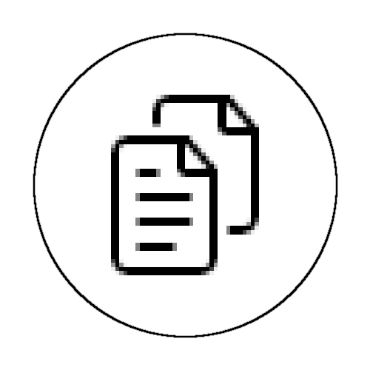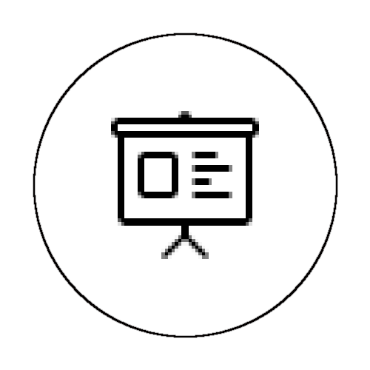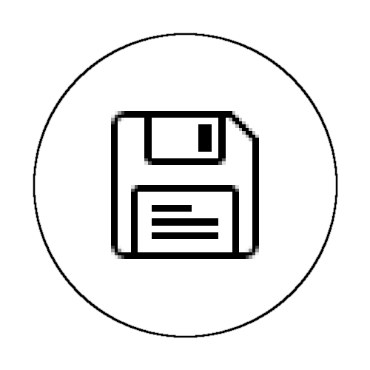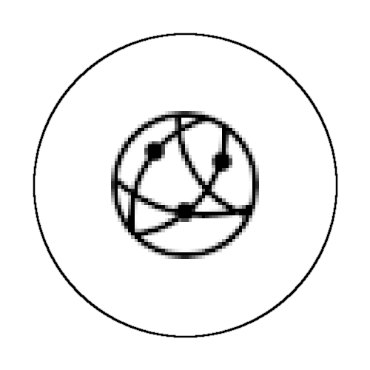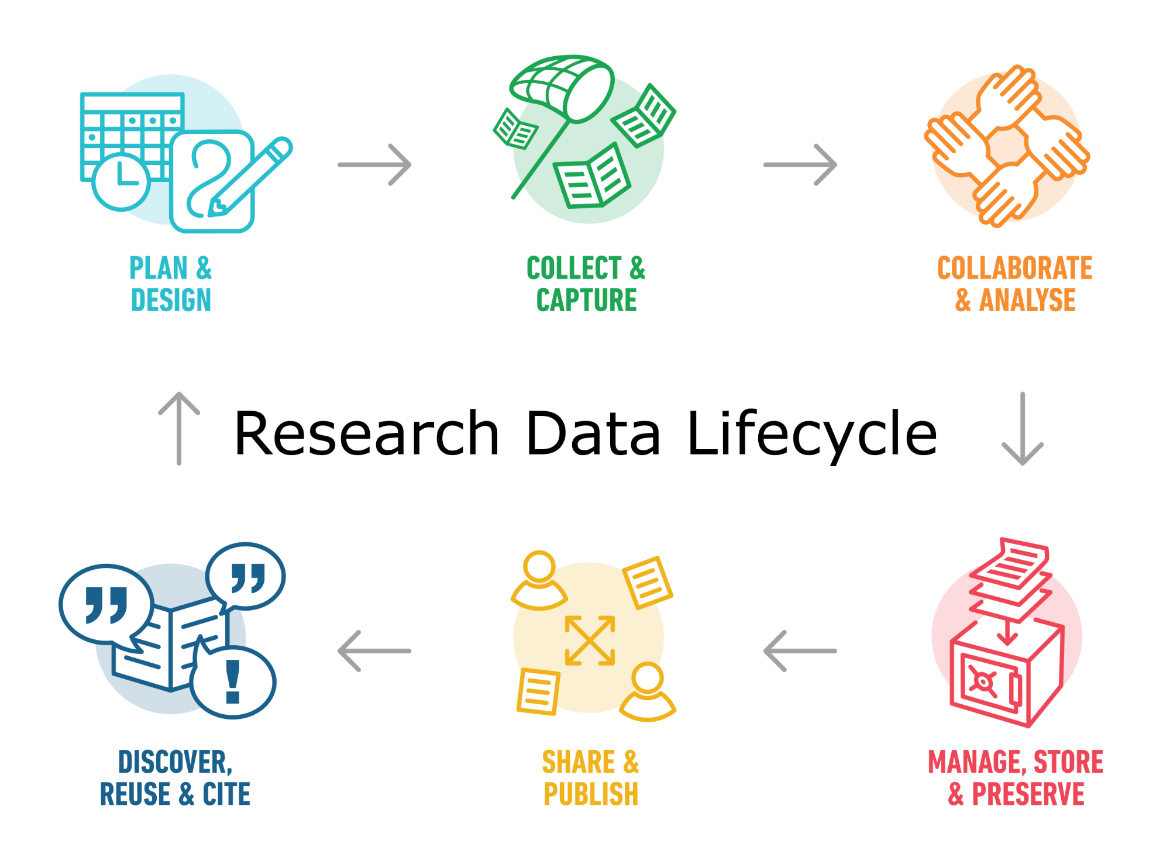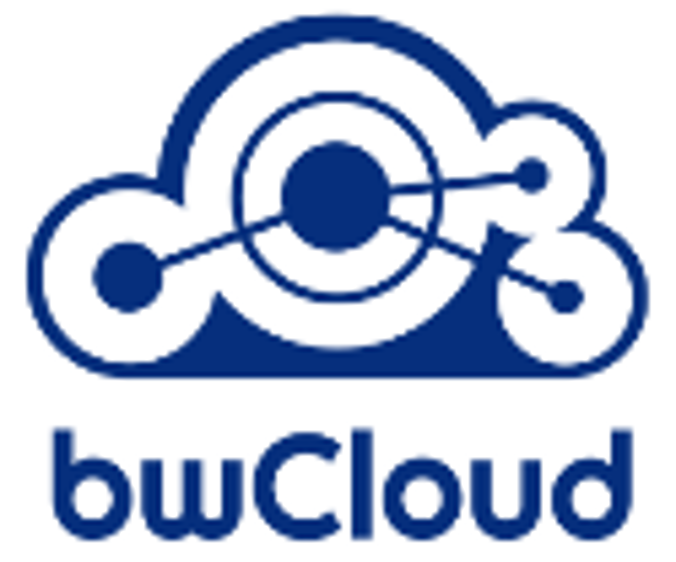[Photos: Pages, Presentation, Floppy Disk, Globa Connection, Iconset "Lynny“ by Matthew Skiles on 1001FreeDownloads.com]
Research data management (RDM) encompasses the processes of transformation, selection and storage of research data with the common goal of keeping them accessible, reusable and verifiable in the long term and independent of individuals (forschungsdaten.info).
The current RDM strategy and data guidelines for the Cluster of Excellence IntCDC are continuously being further developed. We consider it as a fundamental task of RDM to advice, train, and inform researchers on issues related to research data, in particular on questions of data storage, data documentation and making data accessible. Thereby, we acknowledge legal requirements on the one hand, and open-science practices on the other (e.g. FAIR Principles). According to IntCDC's research data policy, the goal is that each publication should be accompanied by a corresponding published dataset. IntCDC researchers are supported in designing sustainable research software, what is part of research software engineering (RSE). Needs-based training at a scientific level is designed, enabling researchers to develop and deliver software in a sustainable manner. Additionally, quality criteria for the recognition of research data and research software as a full publication at the University of Stuttgart are developed.
COMISSION
The main goals of the commission are quality assurance and transparency for digitally oriented research, publication of research data for re-use following the FAIR principles, and support of co-design within IntCDC.
Members
INTERNAL
Office Hours
Every Thursday from 14:00 to 15:00 the office hours are held for all questions about research data management and research software engineering. We can either meet online via WebEx or in person
Further Information
Additional comprehensive information is provided on the internal knowledge base.
TEAM
PUBLICATIONS
2023
- Goth, F., Alves, R., Braun, M., Castro, L. J., Chourdakis, G., Christ, S., Cohen, J., Erxleben, F., Grad, J.-N., Hagdorn, M., Hodges, T., Juckeland, G., Kempf, D., Lamprecht, A.-L., Linxweiler, J., Schwarzmeier, M., Seibold, H., Thiele, J. P., von Waldow, H., & Wittke, S. (2023). Foundational Competencies and Responsibilities of a Research Software Engineer (p. 28). https://doi.org/10.48550/arXiv.2311.11457
2022
- Garkov, D., Müller, C., Braun, M., Weiskopf, D., & Schreiber, F. (2022). Research Data Curation in Visualization : Position Paper. 2022 IEEE Evaluation and Beyond - Methodological Approaches for Visualization (BELIV), 56–65. https://doi.org/10.1109/BELIV57783.2022.00011
- Garkov, D., Müller, C., Braun, M., Weiskopf, D., & Schreiber, F. (2022). Research Data Curation in Visualization : Position Paper (Data). https://doi.org/10.18419/darus-3144
- Brecher, C., Buchmeiser, M. R., Burkert, A., Busemeyer, M. R., Conermann, S., Ertl, T., Friedrich, M., Helmig, R., Hohmann, V., Johnston, A. J., Kollmeier, B., Larkum, M., Louis, J., Menges, A., Morgner, U., Müller, J., Niessen, C., Ohlberger, M., Schäffner, W., … Flemisch, B. (2022). Commitment zu aktivem Daten- und -softwaremanagement in großen Forschungsverbünden : Commitment to active data and software management in large research alliances : Bausteine Forschungsdatenmanagement : 2022, 1. https://doi.org/10.17192/bfdm.2022.1.8412
2021
- Braun, M. (2021). EXC IntCDC - Data Management Plan Template for Research Projects. DaRUS. https://doi.org/10.18419/darus-2116
RESEARCH DATA & SOFTWARE PUBLICATIONS
Emphasizing that research data and research software are actively recognized as an essential part of scientific output, published datasets and software are listed next to the paper publications on the IntCDC website:
TEACHING & INFRASTRUCTURE
Workshops & Seminars
The following recurring events are organized or co-organized by the research data management team of IntCDC.
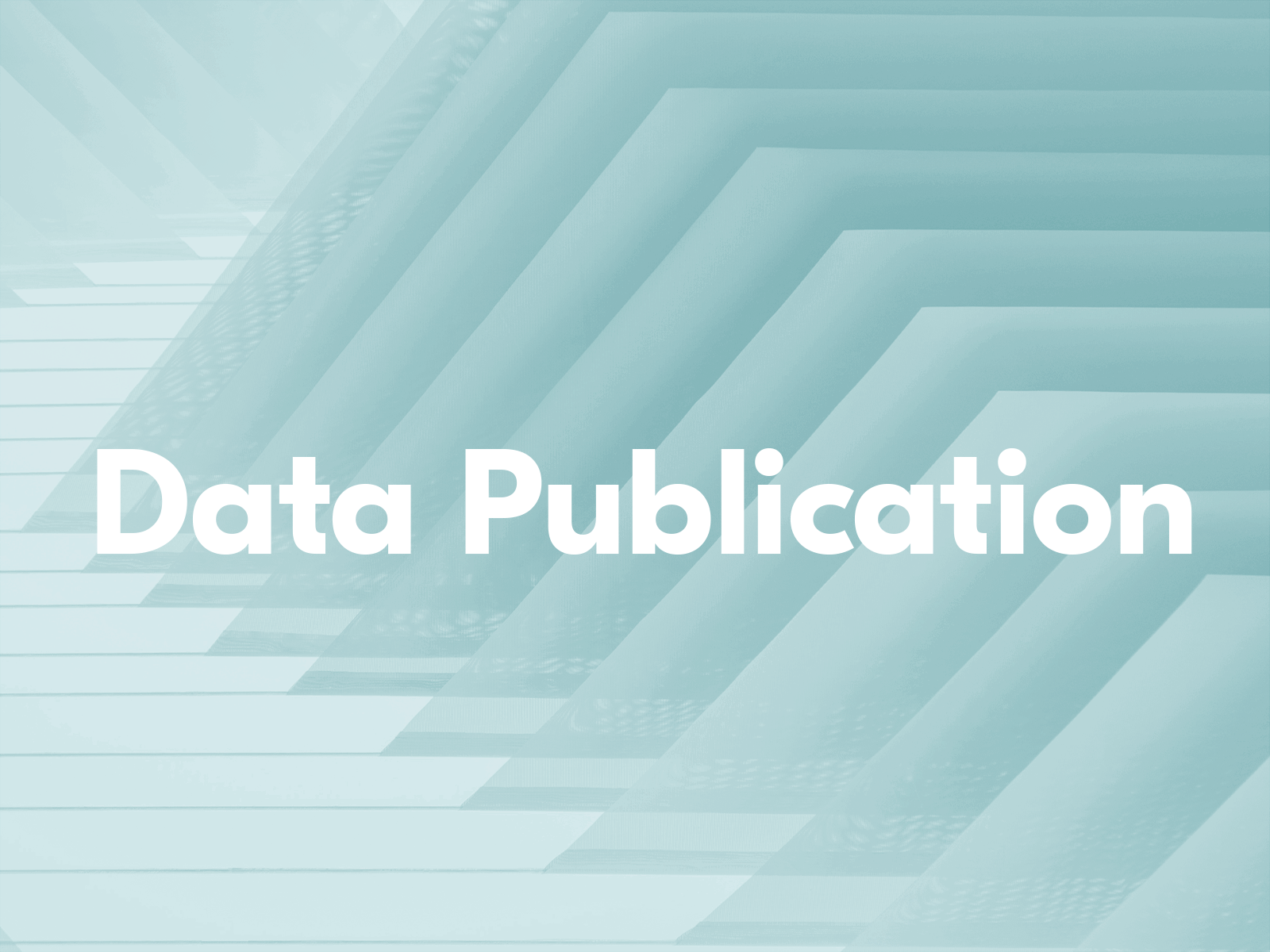 The Practical Data Publication workshop takes place on regular bases and aims to introduce the researchers interactively to the IntCDC-specific RDM workflow. The participants will learn the processes hands-on and afterwards will be able to plan and document their data via the data or software management plan and publish their data on the FAIR data repository DaRUS. The workshop is complemented by regular office hours for individual support.
The Practical Data Publication workshop takes place on regular bases and aims to introduce the researchers interactively to the IntCDC-specific RDM workflow. The participants will learn the processes hands-on and afterwards will be able to plan and document their data via the data or software management plan and publish their data on the FAIR data repository DaRUS. The workshop is complemented by regular office hours for individual support.
Check the ILIAS course page for upcoming dates and more information.
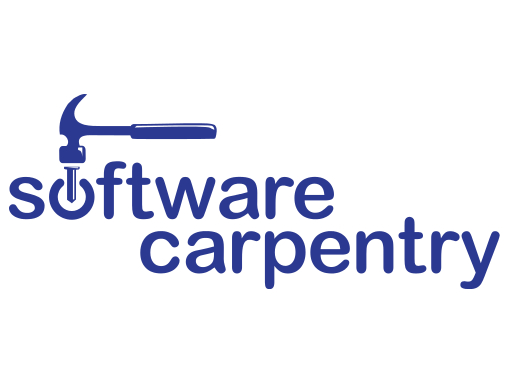 In cooperation with FOKUS, SimTech, and TIK we offer Software Carpentry Workshops on a half-yearly basis. Contents of the workshop are important basics for reproducibility of research with software, like Linux Bash, Version Control with Git and Programming and Plotting in Python. Professional teaching material is maintained by the Carpentries community. As a certified Carpentries Instructor, Matthias Braun is allowed to organize and hold Carpentry Workshops. Registration is open to all students and PhD students of IntCDC and the University of Stuttgart.
In cooperation with FOKUS, SimTech, and TIK we offer Software Carpentry Workshops on a half-yearly basis. Contents of the workshop are important basics for reproducibility of research with software, like Linux Bash, Version Control with Git and Programming and Plotting in Python. Professional teaching material is maintained by the Carpentries community. As a certified Carpentries Instructor, Matthias Braun is allowed to organize and hold Carpentry Workshops. Registration is open to all students and PhD students of IntCDC and the University of Stuttgart.
Check the ILIAS course page for upcoming dates and more information.
Upcoming
| March 19-22, 2024 | Workshop Website | ILIAS Registration |
Past
| October 10-13, 2023 | Workshop Website |
| March 28-31, 2023 | Workshop Website |
| October 4-7, 2022 | Workshop Website |
| October 4-8, 2021 | Workshop Website |
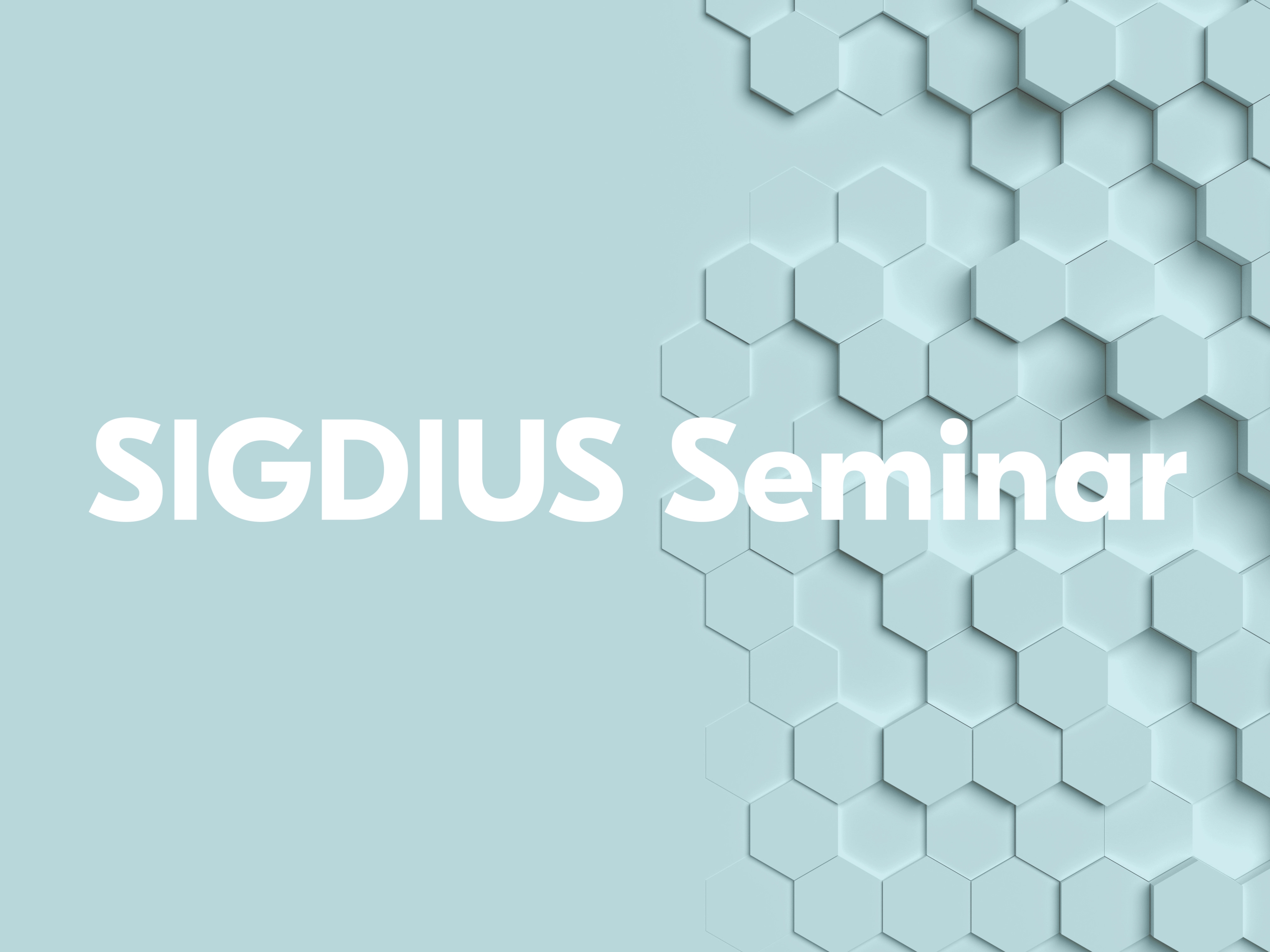 The Special Interest Group Data Infrastructure (SIGDIUS) seminar is organized in cooperation with SimTech and takes place on a monthly basis during lecture time. SIGDIUS provides a forum for interested working groups that want to establish or further develop an RDM infrastructure at the working group or institute level. To this end, we invite internal and external experts to a monthly SIGDIUS seminar for lecture and discussion, but primarily to give SIGDIUS members the opportunity to share their experiences with specific RDM infrastructures.
The Special Interest Group Data Infrastructure (SIGDIUS) seminar is organized in cooperation with SimTech and takes place on a monthly basis during lecture time. SIGDIUS provides a forum for interested working groups that want to establish or further develop an RDM infrastructure at the working group or institute level. To this end, we invite internal and external experts to a monthly SIGDIUS seminar for lecture and discussion, but primarily to give SIGDIUS members the opportunity to share their experiences with specific RDM infrastructures.
Detailed information is provided on the SIGDIUS website.
Data Management Plan
 The IntCDC Data Management Plan describes the data management life cycle for the data, a Research Project of EXC IntCDC will collect, process and/or generate. Moreover, it describes whether and how this data is being used and/or made publicly available for verification and re-use and how the data will be curated and preserved after the end of the project.
The IntCDC Data Management Plan describes the data management life cycle for the data, a Research Project of EXC IntCDC will collect, process and/or generate. Moreover, it describes whether and how this data is being used and/or made publicly available for verification and re-use and how the data will be curated and preserved after the end of the project.
The generic Data Management Plan template of IntCDC is based on the Horizon 2020 template and is published on DaRUS. As stated in the project proposal of IntCDC, each Research Project (RP) has to provide its own Data Management Plan.
Software Management Plan
 As with research data, IntCDC considers research software not as a by-product but as an integral part of science. Software Management Plans (SMP) support organization of project management for research software, ensure transparency and allow quality assurance, and enable researchers to reflect on their own approach to new research software projects in a structured manner.
As with research data, IntCDC considers research software not as a by-product but as an integral part of science. Software Management Plans (SMP) support organization of project management for research software, ensure transparency and allow quality assurance, and enable researchers to reflect on their own approach to new research software projects in a structured manner.
Within IntCDC, we rely on the Software Management Wizard provided by ELIXIR. This online tool provides a state-of-the-art implementation of the FAIR Principles for research software and is continuously improved. The Wizard supports completing the questionnaire with additional hints and meta information. The SMP can be exported to various file formats at any stage, including a machine actionable format.
Collaborative Infrastructure
The following infrastructure and services are provided by the University of Stuttgart and are made available to all participants of IntCDC to support and implement collaborative tasks related to RDM and RSE.
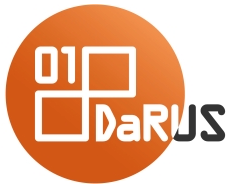 DaRUS, the data repository of the University of Stuttgart, offers a secure location for research data and codes, be it for the administration of own data, for exchange within a research group, for sharing with selected partners or for publishing. Data published on DaRUS complies with the FAIR Principles and is suitable for so called "cold" data that is in a final state and e.g. part of a publication. A persistent identifier (DOI) is assigned to each published dataset. All published datasets are easily citable and reusable for the research community.
DaRUS, the data repository of the University of Stuttgart, offers a secure location for research data and codes, be it for the administration of own data, for exchange within a research group, for sharing with selected partners or for publishing. Data published on DaRUS complies with the FAIR Principles and is suitable for so called "cold" data that is in a final state and e.g. part of a publication. A persistent identifier (DOI) is assigned to each published dataset. All published datasets are easily citable and reusable for the research community.
 GitHub is a provider of internet hosting for software development and version control using Git, extended by own features. Technical Information and Communication Services of the University of Stuttgart (TIK) operates an on-premise instance of GitHub Enterprise for non-commercial research and teaching use.
GitHub is a provider of internet hosting for software development and version control using Git, extended by own features. Technical Information and Communication Services of the University of Stuttgart (TIK) operates an on-premise instance of GitHub Enterprise for non-commercial research and teaching use.
Visibility of Repositories
- GitHub Enterprise
- Public repositories are visible to everybody logged in to GitHub Enterprise with a university account.
- Private repositories are only visible to the members of the organization and to the repository’s members.
- GitHub.com
- Public repositories are visible to all people with access to the Internet.
- Private repositories are only visible to the members of the organization and to the repository’s members.
IntCDC GitHub Organisations
- GitHub.com
 Confluence by Atlassian is a web-based corporate wiki software that enables collaborative knowledge documentation. The University of Stuttgart runs their own on-premise Confluence Data Centre, which is available to all participants of IntCDC and serves as central knowledge base.
Confluence by Atlassian is a web-based corporate wiki software that enables collaborative knowledge documentation. The University of Stuttgart runs their own on-premise Confluence Data Centre, which is available to all participants of IntCDC and serves as central knowledge base.
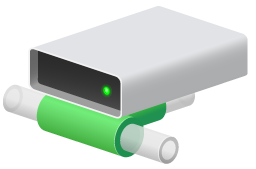 The network share provided by the TIK allows the internal storage and exchange of large data and is the storage location for currently processed research data.
The network share provided by the TIK allows the internal storage and exchange of large data and is the storage location for currently processed research data.
RESEARCH SOFTWARE ENGINEERING
Research software projects at IntCDC are individually supported and also new long-term software projects that support the research within IntCDC are initiated:
- Visual Analytics Framework for Grasshopper (VisuAlFroG)

is a framework that provides various visualization types to support visual analytics for the algorithmic modelling software Grasshopper. Grasshopper for its part is a plug-in of the commercial 3D computer graphics and computer-aided design application software Rhinoceros. The basic architecture of VisuAlFroG consists of a core framework providing general functionality and a modular extension mechanism that easily allows to integrate new visualization types or libraries.- Project Start: March 2023
- Current Status: Prototype
- Github.com Repository
- Internal Project Page
- Contact: RDM team (see below)
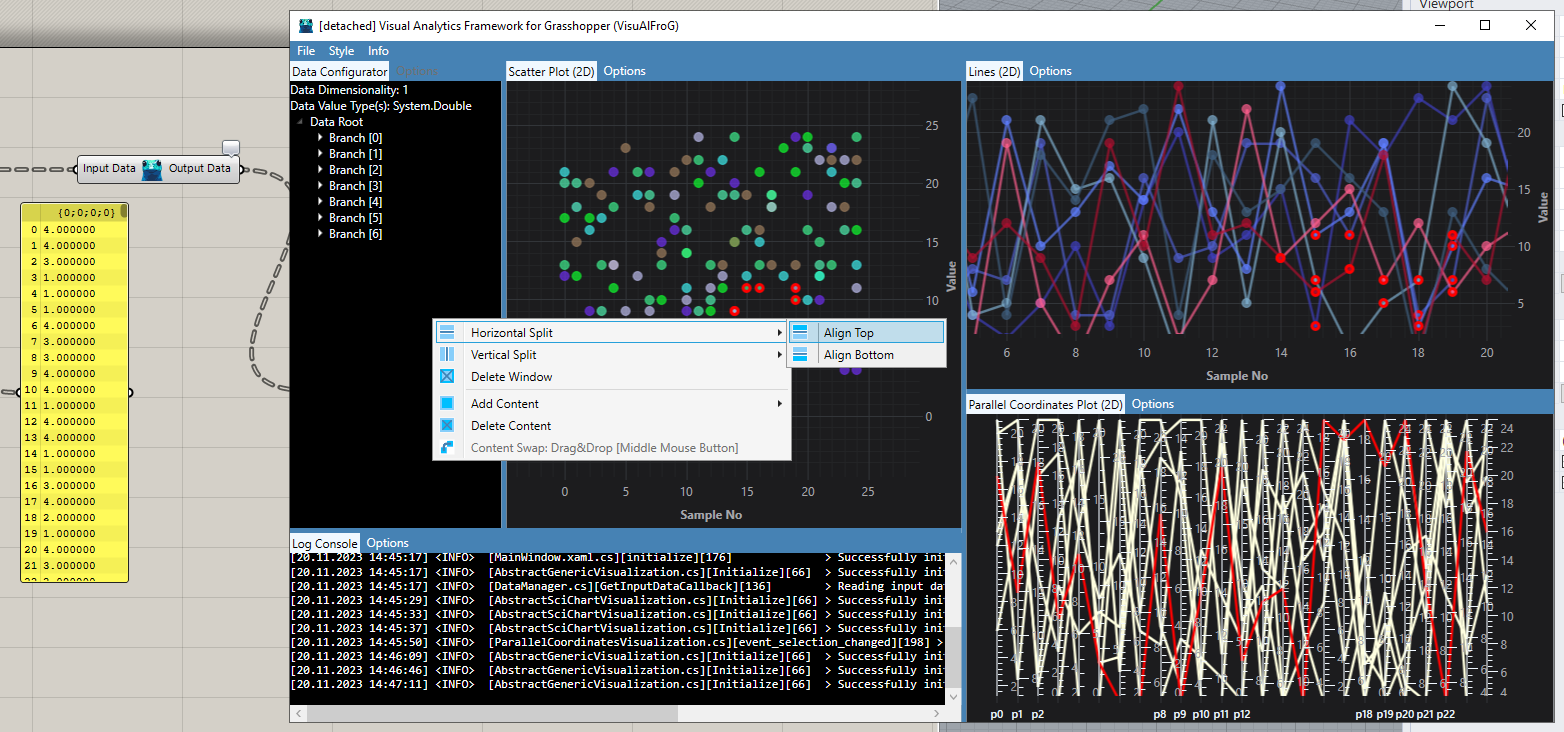
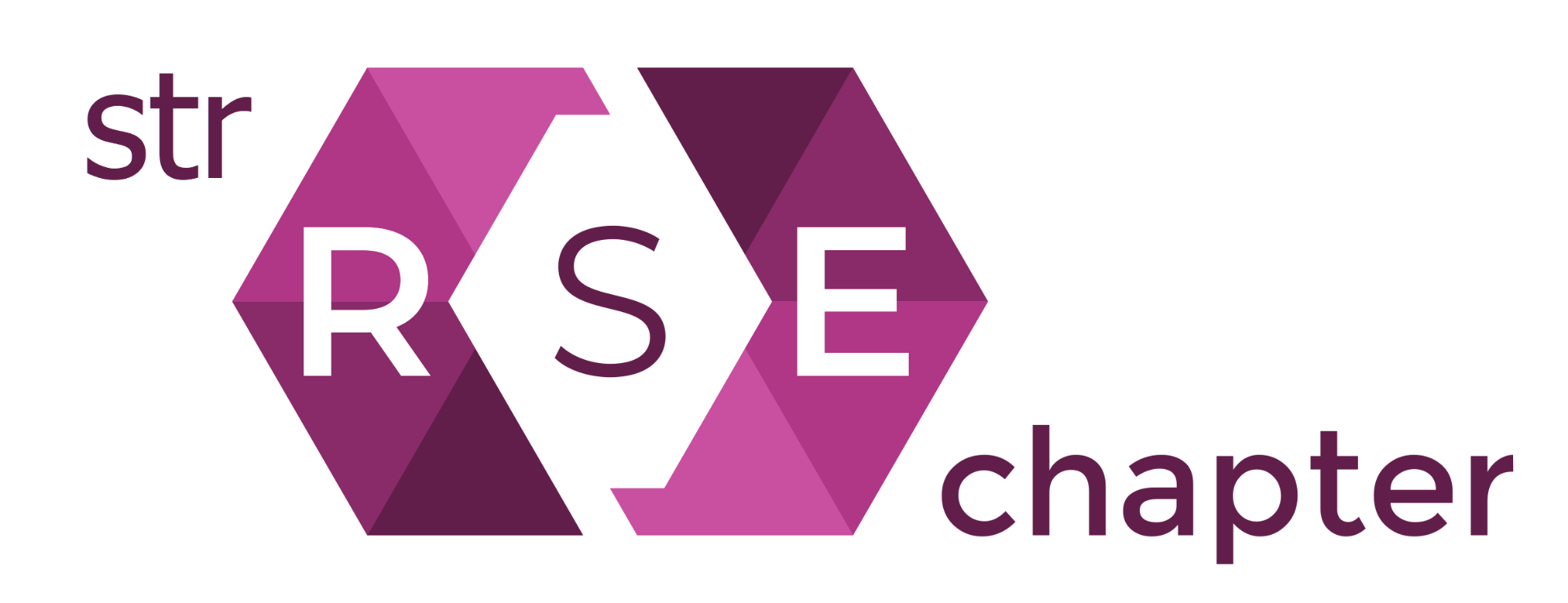 The de-RSE Chapter Stuttgart gathers all people working in or interested or involved in research software engineering (RSEing)in the region of Stuttgart.
The de-RSE Chapter Stuttgart gathers all people working in or interested or involved in research software engineering (RSEing)in the region of Stuttgart.
- Feel free to join the rse-stuttgart mailing list to be informed about all RSE related activities.
- Overview of all deRSE Chapters in Germany
- The German RSE Society de-RSE e.V.
- The RSE Community of Stuttgart exchanges on a regulars' tables after the SIGDIUS seminar.
- Emphasizing the emerging importance for sustainable management of research software at the University of Stuttgart the following position paper "Managing research software at the University of Stuttgart" was published.
- Open RSE positions are regularly communicated via the liste@de-RSE.org mailing list.
In 2020, the position paper Managing research software at the University of Stuttgart (http://dx.doi.org/10.18419/opus-11178), recommends the establishment of an organizational unit for research software development at the University of Stuttgart and an associated pool of Research Software Engineers (RSEs). To this end, the authors propose measures to create and fund corresponding new RSE positions, to integrate existing positions, and to recruit and promote suitable individuals. RSEs are individuals who take care of the design, organization, implementation, testing, documentation, and maintenance of research software. Institutional funding of research software development is necessary because of the increasing importance of software for research and requirements for the corresponding software, e.g. by the DFG.
NETWORKING & INVOLVEMENT
- FoKUS Meetings
- FDM-AG (German): Working group consisting of interested researchers and representatives of infrastructure institutions developing processes, guidelines and best practices for research data management at the University of Stuttgart
- Carpentries Community Discussions - Regional DACH Call
- Member of Research Data Alliance (RDA) Deutschland e.V. (Basic Principles of RDA)
- Member of deRSE e.V.
- German National Research Data Infrastructure (NFDI)
- Research Data Alliance (RDA) - Working/Interest Groups:
Policies & Commitment
-
-
Research Data Policy of the University of Stuttgart [PDF] - Competence Centre for Research Data Management at the University of Stuttgart
-
-
Max Planck Institute for Intelligent Systems

-
Rules of Good Scientific Practice [PDF]
-
-
- Code of Conduct - Guidelines for Safeguarding Good Research Practice [PDF]
- Guidelines on the Handling of Research Data [PDF]
-
Specification of Requirements Relating to the Handling of Research Data in Funding Proposals. See supplemental catalogue of questions [PDF]
In a joint document that is also signed by Achim Menges as the director of IntCDC, major German research associations (20 clusters of excellence and 6 collaborative research centres) emphasize the importance of research data and software for their research processes. In the declaration, which was published [PDF] in the journal magazine Bausteine Forschungsdatenmanagement (No. 1, 2022) on March 14, 2022, the participating institutions commit themselves to support their researchers as a consortium in handling data and software in accordance with the FAIR principles in agreement with the code "Guidelines for Safeguarding Good Scientific Practice" of the German Research Foundation (DFG) and to use and provide adequate research data management tools and services for this purpose. The foundation for the joint document was laid during the virtual strategy workshop "Data and software management in large research networks" in April 2021, which was organized by the two Clusters of Excellence SimTech and IntCDC at the University of Stuttgart. The spokespersons of the research alliances wrote the final text and clarified the purpose of the Commitment:
- With the Commitment, the signatory research alliances send a signal that they recognize the importance of research data management (RDM) and that they are taking measures to meet this importance.
- The commitment shows that the research alliances will contribute their competence in the topic and want to actively shape the future of RDM together with explicit RDM initiatives such as the National Research Data Infrastructure (NFDI) or the European Open Science Cloud (EOSC).
- In a recent DFG impulse paper with recommendations for the recently started legislative period of the Bundestag, the topic is given high priority with the impulse "Shaping research data management for long-term sustainability". The DFG funding program "Information Infrastructures for Research Data" was also recently updated. The commitment signals, that the research alliances support these current developments and can act as research nuclei for more far-reaching initiatives.

FURTHER INFORMATION
Upcoming
| ... |
|
Past
| deRSE Conference 2024 |
March 05-07 2024 |
| deRSE Unconference 2023 |
September 26-28 2023 |
| International Data Week 2023 |
October 23-26 2023 |
|
February 20-21 2023 |
|
|
February 13-17 2023 |
|
|
NFDI4Ing Conference 2022 |
October 16-17 2022 |
|
International Data Week 2022 |
June 20-23 2022 |
|
RDA Deutschland Tagung 2022 |
February 21-25 2022 |
|
rSE22-Konferenz |
February 21-25 2022 |
|
NFDIxCS Forschungsdaten-Soiree
|
2021 |
TIK
The Technical Services for Information and Communication of the University of Stuttgart (TIK) offer an extensive IT-service portfolio. See all services listed on the overview.
Highlights
ZENDAS
See ZENDAS (Central Data Protection Office of the Universities in Baden-Württemberg ) for information on data protection issues (Note: Some pages are only accessible from within the university network).
- Here you can find official English samples for research projects that require a declaration of consent:
- Software Sustainability Institute facilitated the advancement of software in research.
- Forschungsdaten.info is the German-language information portal on research data management.
- NFDI (Association German National Research Data Infrastructure) promotes science and research through a national research data infrastructure that establishes and develops comprehensive research data management in Germany and increases the efficiency of the entire German science system.
- NFDI4Ing (National Research Data Infrastructure for Engineering Sciences) brings together the engineering communities to work towards proper research data management (RDM) that implements the FAIR data principles.
- NFDI4Culture (Consortium for Research Data on Material and Immaterial Cultural Heritage) establishes a needs-based infrastructure for research data ranging from architecture, art history and musicology to theatre, dance, film and media studies.


